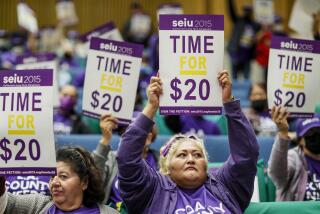California equal pay bill may be toughest in nation

California’s new Fair Pay Act, which awaits Gov. Jerry Brown’s signature, may be the nation’s most aggressive attempt yet to close the salary gap between men and women.
Supporters said the legislation, passed unanimously by the California Senate on Monday, closes loopholes that prevented enforcement of existing anti-discrimination law.
The bill ensures that male and female employees who perform “substantially similar” work receive equal pay, even if their job titles aren’t the same or if they work in different offices for the same employer.
SIGN UP for the free California Inc. business newsletter >>
That means a hotel’s female housekeepers could challenge higher wages paid to male janitors because they do similar work despite different job titles.
In addition, employees would be able to ask about and discuss co-workers’ wages without fear of retaliation from employers.
“It’s been a long march to try to get laws that are strong enough that would actually close the gender wage gap in this country,” said Noreen Farrell, executive director of civil rights organization Equal Rights Advocates, which was a co-sponsor of the bill. “We have been envisioning what would be the strongest state law for equal pay in the nation for some time, and this is it.”
Aileen Rizo, a math consultant at the Fresno County Office of Education, discovered in 2012 that a male colleague was making $12,000 more a year for the same work even though he was hired four years after her. The Fresno resident, whose lawsuit is still pending, has traveled to the state Capitol at least half a dozen times to testify and advocate for the Fair Pay Act.
“We were just cheering and so happy,” Rizo, 40, said of the legislation’s approval Monday. “It’s going to strengthen the tools that women have to fight against pay discrimination.”
Brown aide Nancy McFadden tweeted last week that the governor “will sign CA Fair Pay Act when it reaches his desk.”
The bill’s author, state Sen. Hannah-Beth Jackson (D-Santa Barbara), cited studies that found that in 2014, California women earned an average of 84 cents to every dollar men earned. The gap is even larger for women of color — Latinas in California make 44 cents for every dollar that white men make, the biggest gap for Latinas in the nation. Collectively, female full-time workers in California earn about $33.6 billion less each year than male full-time workers.
Nationally, women make 78 cents for every dollar men make.
The bill applies to public and private businesses. The act also eliminates the requirement that the comparable employees be in the same establishment, meaning a female worker could challenge the wages paid to a male employee working in the same position for the same employer, but at a different work site.
These provisions, along with the “similar work” and anti-retaliation measures, make the bill the strongest equal pay act in the nation, law experts said.
“What this bill does is it goes back to the concept of pay equity,” said Hina Shah, director of the Women’s Employment Rights Clinic at Golden Gate University School of Law. “It eliminates barriers for people not just in the same jobs, but also who are doing substantially the same work. It’s looking beyond just what the title is.”
The Senate vote comes six months after the high-profile Silicon Valley gender-discrimination lawsuit filed by Ellen Pao, former interim chief executive of Reddit. A civil jury found that powerful venture capital firm Kleiner Perkins Caulfield & Byers did not discriminate against Pao, a one-time junior partner, because of her gender, but the trial sparked discussion of the unequal playing field in the technology industry.
The nursing industry, too, has faced criticism over pay disparities between men and women.
A study published in March in the Journal of the American Medical Assn. found that male registered nurses earn nearly $11,000 more than female RNs. Only about half of that difference can be attributed to factors such as work experience, education and clinical specialty.
“For us, this hits and strikes right at the heart of our own membership,” said Stephanie Roberson, legislative advocate for the California Nurses Assn., an Oakland based-nurses union. “Over 90% of our workforce is female. We see it in our own membership and for us, it levels the playing field.”
The bill received bipartisan support and even garnered the approval of the California Chamber of Commerce, which dropped its initial opposition to the bill after Jackson, the bill’s author, agreed to clarify the circumstances under which employers could provide a pay differential, such as to compensate for more extensive training, experience or education.
Under the Fair Pay Act, employers must prove that wage differentials are based on seniority, merit, a system that measures earnings by quantity or quality of production, or a “bona fide” factor other than sex that is a legitimate business necessity.
In a statement, the California Chamber of Commerce said it believed the clarification would help employers “navigate their pay structure” and “avoid unnecessary litigation” about what business purposes would qualify as a legitimate factor.
Critics say the law doesn’t go far enough.
The California chapter of the National Organization for Women opposed the bill unless it was amended to include others who face discrimination, such as those in the LGBT community, disabled people and those who are excluded based on race or ethnicity.
The bill also doesn’t specify provisions for men of color, who also face equal pay disparities, said Patricia Bellasalma, past president of the California branch of NOW.
“Why are we saying, in 2015, that we are reiterating all of these historic exclusions?” she said. “We had to decide whether we were going to remain silent while large swaths of women and men were denied.”
Jackson said she expected to see across-the-board changes for all employees after the Fair Pay Act is signed into law.
“This is a very good and substantial first step,” she said. “I am very confident once we get employers reviewing the basis by which they pay employees, we will see substantial changes in the way they pay their workers.”
Jackson said the law will be enforced by the state Division of Labor Standards Enforcement, which decides wage claims and investigates discrimination complaints.
Employees can file complaints with the agency, which will investigate the matter while keeping the worker’s name confidential. If a claim is validated, the Division of Labor Standards Enforcement will request wages on the employee’s behalf, she said.
The agency can file legal action if the employer doesn’t pay. Employees can also file a civil lawsuit directly through the California Superior Court.
Twitter: @smasunaga
ALSO
Ellen Pao verdict: No gender bias or retaliation by Kleiner Perkins
Uber drivers granted class-action status in legal battle
Haggen accuses Albertsons of sabotaging store takeover, sues for $1 billion
More to Read
Inside the business of entertainment
The Wide Shot brings you news, analysis and insights on everything from streaming wars to production — and what it all means for the future.
You may occasionally receive promotional content from the Los Angeles Times.











